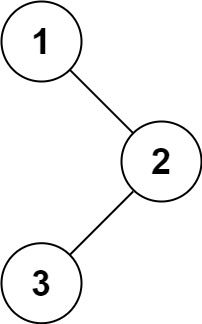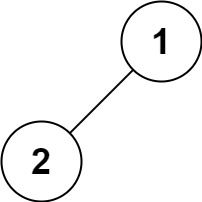Given the root of a binary tree, return the inorder traversal of its nodes' values.
Example 1:
Input: root = [1,null,2,3] Output: [1,3,2]
Example 2:
Input: root = [] Output: []
Example 3:
Input: root = [1] Output: [1]
Example 4:
Input: root = [1,2] Output: [2,1]
Example 5:
Input: root = [1,null,2] Output: [1,2]
Constraints:
- The number of nodes in the tree is in the range
[0, 100]. -100 <= Node.val <= 100
Follow up:
Recursive solution is trivial, could you do it iteratively?
Recusive:
# Definition for a binary tree node.
# class TreeNode:
# def __init__(self, val=0, left=None, right=None):
# self.val = val
# self.left = left
# self.right = right
class Solution:
def inorderTraversal(self, root: TreeNode) -> List[int]:
def inorder(root):
if root:
inorder(root.left)
res.append(root.val)
inorder(root.right)
res = []
inorder(root)
return resNon-recursive:
# Definition for a binary tree node.
# class TreeNode:
# def __init__(self, val=0, left=None, right=None):
# self.val = val
# self.left = left
# self.right = right
class Solution:
def inorderTraversal(self, root: TreeNode) -> List[int]:
s = []
res = []
while root or s:
if root:
s.append(root)
root = root.left
else:
root = s.pop()
res.append(root.val)
root = root.right
return resRecursive:
/**
* Definition for a binary tree node.
* public class TreeNode {
* int val;
* TreeNode left;
* TreeNode right;
* TreeNode() {}
* TreeNode(int val) { this.val = val; }
* TreeNode(int val, TreeNode left, TreeNode right) {
* this.val = val;
* this.left = left;
* this.right = right;
* }
* }
*/
class Solution {
private List<Integer> res;
public List<Integer> inorderTraversal(TreeNode root) {
res = new ArrayList<>();
inorder(root);
return res;
}
private void inorder(TreeNode root) {
if (root != null) {
inorder(root.left);
res.add(root.val);
inorder(root.right);
}
}
}Non-recursive:
/**
* Definition for a binary tree node.
* public class TreeNode {
* int val;
* TreeNode left;
* TreeNode right;
* TreeNode() {}
* TreeNode(int val) { this.val = val; }
* TreeNode(int val, TreeNode left, TreeNode right) {
* this.val = val;
* this.left = left;
* this.right = right;
* }
* }
*/
class Solution {
public List<Integer> inorderTraversal(TreeNode root) {
if (root == null) {
return Collections.emptyList();
}
List<Integer> res = new ArrayList<>();
Deque<TreeNode> s = new ArrayDeque<>();
while (root != null || !s.isEmpty()) {
if (root != null) {
s.push(root);
root = root.left;
} else {
root = s.pop();
res.add(root.val);
root = root.right;
}
}
return res;
}
}Recursive:
var inorderTraversal = function(root) {
let res = [];
function inorder(root){
if(root){
inorder(root.left);
res.push(root.val);
inorder(root.right);
}
}
inorder(root);
return res;
};Non-recursive:
var inorderTraversal = function (root) {
let res = [], stk = [];
let cur = root;
while (cur || stk.length !== 0) {
while (cur) {
stk.push(cur);
cur = cur.left;
}
let top = stk.pop();
res.push(top.val);
cur = top.right;
}
return res;
};


